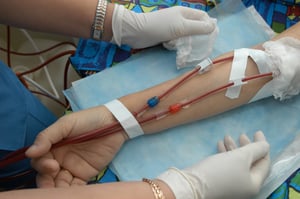 Anemia occurs when your blood lacks an adequate amount of healthy red blood cells, which carry oxygen throughout the body. A common type of anemia is iron deficiency anemia, caused by an insufficient amount of iron. A lack of iron in your blood makes it difficult to produce hemoglobin, which carries oxygen in your bloodstream. Iron deficiency anemia can carry subtle symptoms and health consequences but can be remedied through infusion therapy.
Anemia occurs when your blood lacks an adequate amount of healthy red blood cells, which carry oxygen throughout the body. A common type of anemia is iron deficiency anemia, caused by an insufficient amount of iron. A lack of iron in your blood makes it difficult to produce hemoglobin, which carries oxygen in your bloodstream. Iron deficiency anemia can carry subtle symptoms and health consequences but can be remedied through infusion therapy.
What Are the Signs of Iron Deficiency?
Iron deficiency has many signs. It is not uncommon for these signs to be so slight that they go unnoticed but become more intense and apparent as this condition worsens. Iron deficiency symptoms include:
- Weakness
- Fatigue
- Lightheadedness
- Brittle nails
- Pale skin
- An inflamed or sore tongue
- Chest pain
- Rapid heartbeat
- Cold hands and feet
- Shortness of breath
You should see a doctor if you experience any of these symptoms or find these chronic conditions worsening. Iron deficiency anemia shouldn’t be self-diagnosed and treated with supplements. Doing so can create excessive accumulations that can damage the liver and create other health issues. Your healthcare provider can assess, diagnose, and treat the cause of these symptoms, specifically if they are caused by an iron deficiency.
What Causes Iron Deficiency Anemia?
When your blood doesn’t have enough iron to create hemoglobin. Hemoglobin is the component that enables your red blood cells to carry oxygen throughout the body. When your blood lacks iron, it cannot generate hemoglobin. This can occur if you are not getting enough or are losing too much iron.
A lack of iron in your diet can be a crucial contributor. Eggs, meat, and leafy greens are iron-rich and need to be a part of your daily nutrition. Blood loss from a hiatal hernia, peptic ulcer, a heavy period, or chronic blood loss from within the body can drastically reduce your red blood cell count and create an iron deficiency. You may also have an unknown inability to absorb iron. Iron is absorbed through the small intestine. Gastrointestinal conditions like celiac disease can impact your intestine’s ability to take nutrients, like iron, from your digestive tract and apply it appropriately.
What are the Health Risks of Iron Deficiency?
If you suffer from an iron deficiency, other serious health issues can arise if left untreated. For infants and children, a lack of iron can create problems with development and growth and enhance susceptibility to infections. An iron deficiency can also lead to an irregular or rapid heartbeat. When there is less oxygen in your blood, your heart will try and compensate for it, which can result in an enlarged heart and heart failure.
How Can Infusion Therapy Treat Iron Deficiency?
If you are suffering from iron deficiency, an iron infusion is one of the most effective treatments available. An iron sucrose injection can provide the necessary iron that isn’t absorbed or consumed. Through this process, iron is injected through the vein and directly into the bloodstream. The team at Lane Infusion Center can safely and effectively administer this treatment to restore the iron that your bloodstream and body require.




